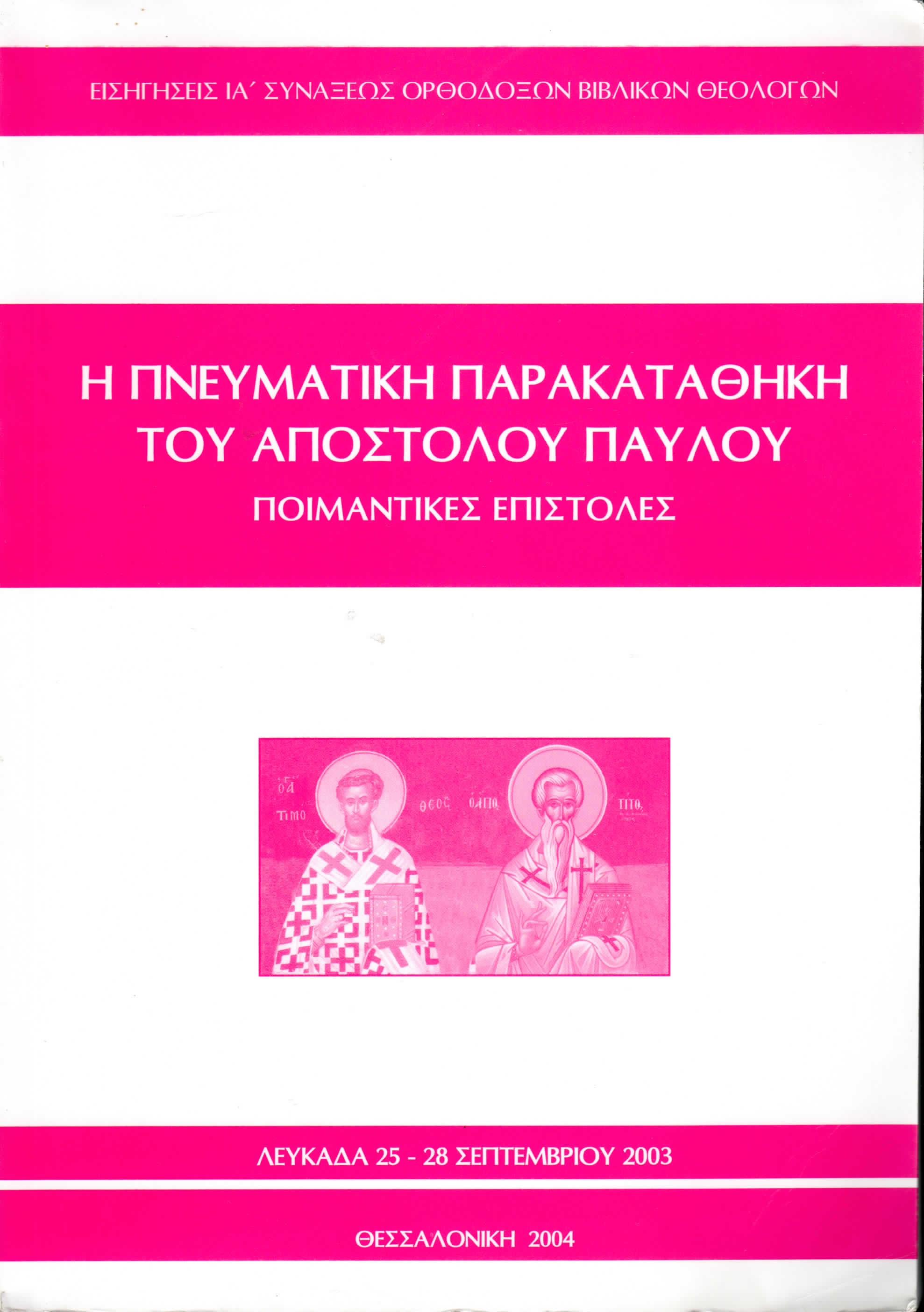Volumes of collections of essays which are entirely about the Pastorals (in whole or in part) are not common. Until a year or so ago, I was only aware of six:
Bieringer, Reimund, ed. 2 Timothy and Titus Reconsidered / Der 2. Timotheus- und der Titusbrief in neuem Licht. Colloquium Oecumenicum Paulinum 20. Leuven: Peeters, 2018.
de Virgilio, Giuseppe, ed. Il deposito della fede: Timoteo e Tito. Supplementi alla Rivista Biblica 34. Bologna: Dehoniane, 1998.
Donfried, Karl Paul, ed. 1 Timothy
Reconsidered. Colloquium Oecumenicum Paulinum 18. Leuven: Peeters, 2008.
Köstenberger, Andreas J. and Terry L. Wilder, eds. Entrusted with the Gospel: Paul’s Theology in the Pastoral Epistles. Nashville: B&H, 2010.
Köstenberger, Andreas J. and Thomas R. Schreiner, eds. Women in the Church: An Interpretation and Application of 1 Timothy 2:9–15. 3rd ed. Wheaton, IL: Crossway, 2016.
Weidemann, Hans-Ulrich, and Wilfried Eisele, eds. Ein Meisterschüler: Titus und sein Brief. Michael Theobald zum 60. Gerburtstag. Stuttgarter Bibelstudien 214. Stuttgart: Katholisches Bibelwerk, 2008.
I was pleased to discover another, a privately printed volume of scholarly presentations from an academic conference on the Pastorals held in Thessaloniki in 2003: Ἡ πνευματική παρακαταθήκη τοῦ Ἀποστόλου Παύλου. Ποιμαντικές Ἐπιστολές [The Spiritual Depository of Paul the Apostle: Pastoral Epistles]. Εἰσηγήσεις ΙΑ´ Συνάξεως Ὀρθοδόξων Βιβλικῶν Θεολόγων: Λευκάδα 25–28 Σεπτεμβρίου 2003 (Thessaloniki: privately published, 2004). A couple of the essays are in English, but most are in Modern Greek (though a number of those have English-language summaries included). The essays are all written by authors who are Orthodox, though not all of them are self-consciously treating the letters from that perspective.
My profound thanks goes to Christos Karakolis, without whose help I would not have been able to obtain this work. Christos is a professor of New Testament at the National and Kapodistrian University of Athens, and has an essay included in the volume. He graciously provided me a copy of the volume, and assisted with the English translation of the table of contents.
I provide below a list of the essays included in the volume, most of which are well-nigh impossible to obtain through standard channels. Though it would be inappropriate for me to post the entire volume online, researchers in the Pastorals may obtain specific essays on a personal basis for research purposes; email me at chuckbumgardner at gmail.com with your request.
__________________
Agouridis, Savvas (Σαββας
Αγουριδης). “Η φύση της αίρεσης
που καταπολεμούν οι ποιμαντικές επιστολές [The nature of the sect fought
by the Pastoral Epistles].” Pages 31–40.
Atmatzidis, Charalampos (Ατματζιδης,
Χαραλαμπος). “Οι ηθικές προτροπές
για τον πλούτο και τους πλουσίους στο Α’ Τιμ. 6 και η Καινοδιαθηκική ηθική
[The ethical exhortations regarding wealth and the wealthy in 1 Tim. 6 and the
ethics of the New Testament].” Pages 41–84. [English-language summary on p. 84]
Vassiliadis, Petros (Βασιλειαδης,
Πετρος). “Μετανεωτερικότητα, σταυρική
θεολογία και οι συνέπειές τους για τις ποιμαντικές επιστολές
[Postmodernity, theologia crucis, and their consequences for the Pastoral
Epistles].” Pages 85–100. [English-language summary on pp. 99-100]
Galanis, Ioannis (Γαλανης,
Ιωαννης). “Η χρήση των ποιμαντικών
επιστολών στα έργα των εκκλησιαστικών συγγραφέων της ανατολικής εκκλησίας
[The use of the Pastoral Epistles in the works of ecclesiastical writers in the
Eastern Church].” Pages 101–12.
Galitis, Georgios A. (Γαλιτης,
Γεωργιος). “Οι ποιμαντικές
επιστολές στη σύγχρονη έρευνα [The Pastoral Epistles in modern
research].” Pages 113–30.
Despotis, Sotirios (Δεσποτης,
Σωτηριος). “Η Χριστολογία των
Ποιμαντικών Επιστολών [The Christology of the Pastoral Epistles].” Pages
131–50. [English-language summary on pp. 148–49]
Doikos, Damianos (Δοϊκος,
Δαμιανος). “‘Χήρας τίμα τάς όντως
χήρας’ (Α’Τιμ.5,3-16).”
Pages 151–62.
Ioannidis, Thomas (Ιωαννιδης,
Θωμας). “Οι ύστεροι καιροί και οι έσχατες ημέρες στις Α’
και Β’ προς Τιμόθεον επιστολές [The end of all times and the last days
in the First and Second Epistles to Timothy].” Pages 163–92. [English-language
summary on pp. 189–91]
Karavidopoulos, Johannes (Καραβιδοπουλος,
Ιωαννης). “Η σωτηριολογία των
ποιμαντικών επιστολώ [The soteriology of the Pastoral Epistles].” Pages
193–204. [English-language summary on p. 203]
Karakolis, Christos (Καρακολης,
Χρηστος). “‘Λέγοντες την ανάστασιν
ήδη γεγονέναι’ (Β΄ Τιμ. 2,18):
Ερμηνευτική, συγκριτική και θεολογική
θεώρηση μιας εσχατολογικής παρεκτροπής [‘Saying that the resurrection
has already happened’ (2 Timothy 2:18): Exegetical, comparative and theological
view of an eschatological deviation].” Pages 205–24.
Kirov, Dimitar Popmarinov. “Godlessness according to 2
Timothy 3.1–9 and Ps. 13(14). Some biblical and theological attitudes in the
light of the situation in a postcommunist country.” Pages 225–40.
[Greek-language summary on pp. 238–40]
Koltsiou-Nikita, Anna (Κόλτσιου-Νικήτα,
Άννα). “To ‘κάτοπτρον επισκόπου’
στις ποιμαντικές επιστολές και το γραμματειακό του πλαίσιο [The ‘mirror
of the bishop’ in the Pastoral Epistles and its literary context].” Pages
241–64. [German-language summary on p. 264]
Mihoc, Vasile. “The Mission in the Pastoral Letters.” Pages
265–86. [Greek-language summary on pp. 284–85]
Nikolakopoulos, Constantine (Νικολακοπουλος,
Κωνσταντινος). “Επόψεις της
‘Παυλείου’ ρητορικής στις δυο προς Τιμόθεον επιστολές [Aspects of
‘Pauline’ rhetoric in the two letters to Timothy].” Pages 287–304
Papademetriou, Kyriakoula (Παπαδημητριου,
Κυρiακουλα). “Η σημασιολογία της
λ. υγιαίνω στις ποιμαντικές επιστολές [The semantics of the word υγιαίνω
in the Pastoral Epistles].” Pages 305–34. [English-language summary on p. 333]
Paparnakis, Athanasios (Παπαρνακης, Αθανασιος). “‘’Από βρέφους τά ιερά γράμματα οίδας’ (Β’ Τιμ. 3,15). Η θρησκευτική αγωγή του παιδιού στον ιουδαϊσμ [‘From childhood you have been acquainted with the sacred writings’ (2 Tim 3:15). Religious education of children in Judaism].” Pages 335–60. [English-language summary on p. 360]
Sakkos, Stergios N. (Σακκος, Στεργιος Ν.). “Ενα εκκλησιαστικο αξιωμα για τη γυναικα (Α’ Τιμ. 5,3–16) [An ecclesiastical office for women (1 Tim 5:3–16)].” Pages 361–85.


 Michael Theobald is a German academic who published rather extensively on the Pastorals in his later career. To my knowledge, however, all of his work on the letters is in German (save for the just-published entry on Titus in The Paulist Bible Commentary), and so English-speaking students of the Pastorals may not be as familiar with his scholarship.
Michael Theobald is a German academic who published rather extensively on the Pastorals in his later career. To my knowledge, however, all of his work on the letters is in German (save for the just-published entry on Titus in The Paulist Bible Commentary), and so English-speaking students of the Pastorals may not be as familiar with his scholarship.


